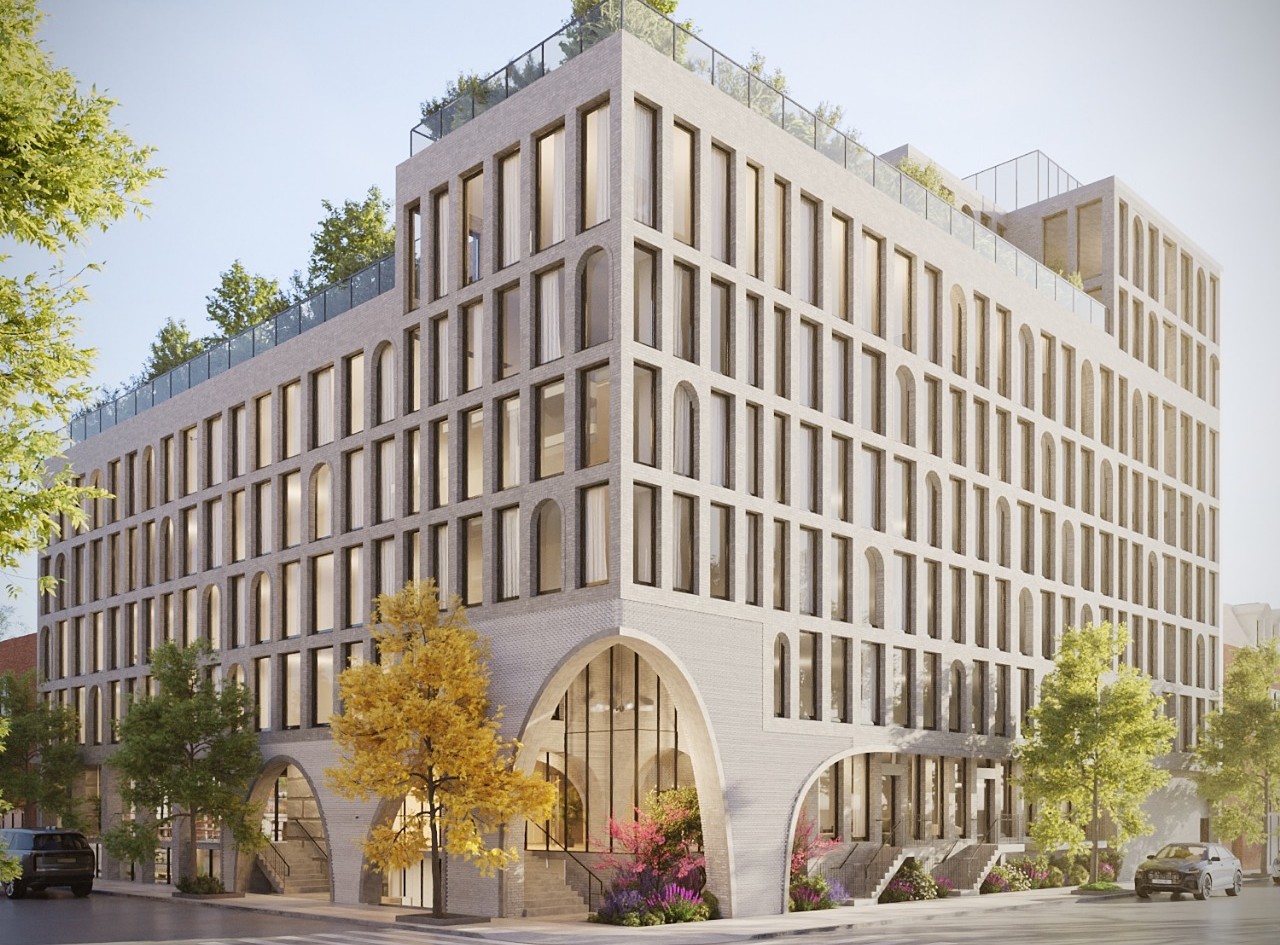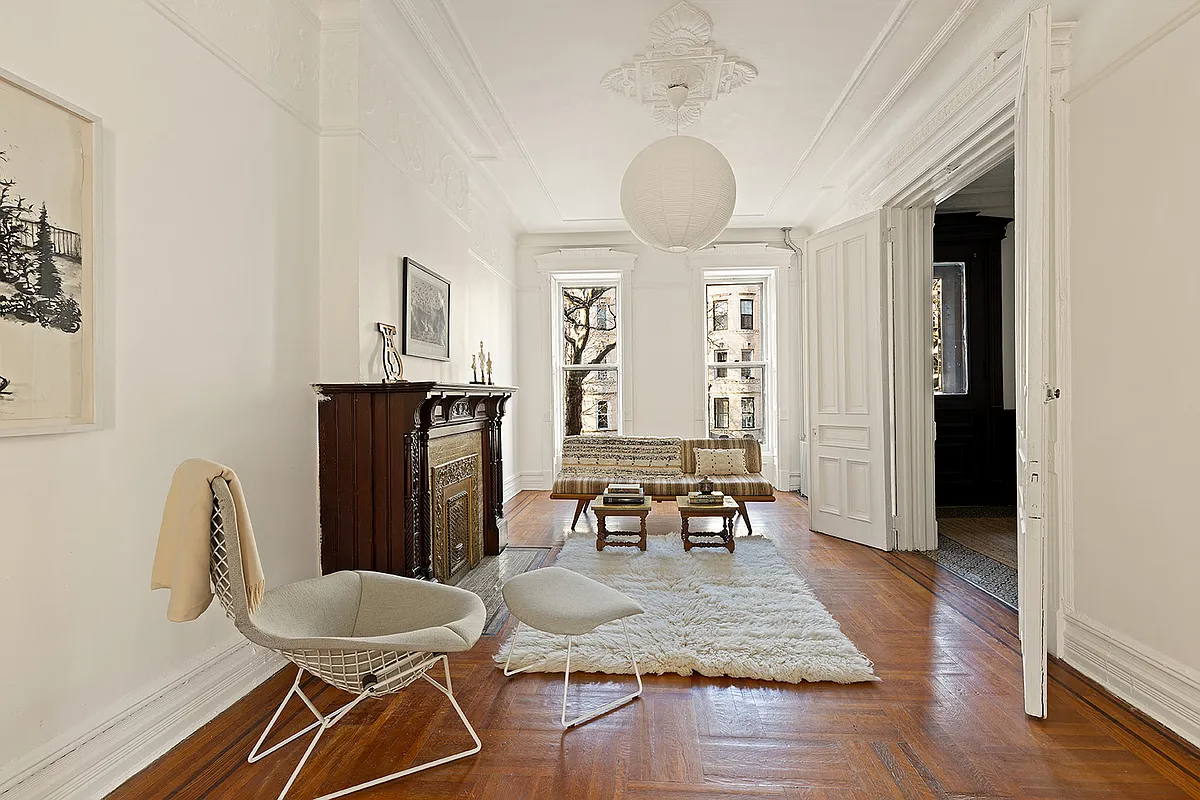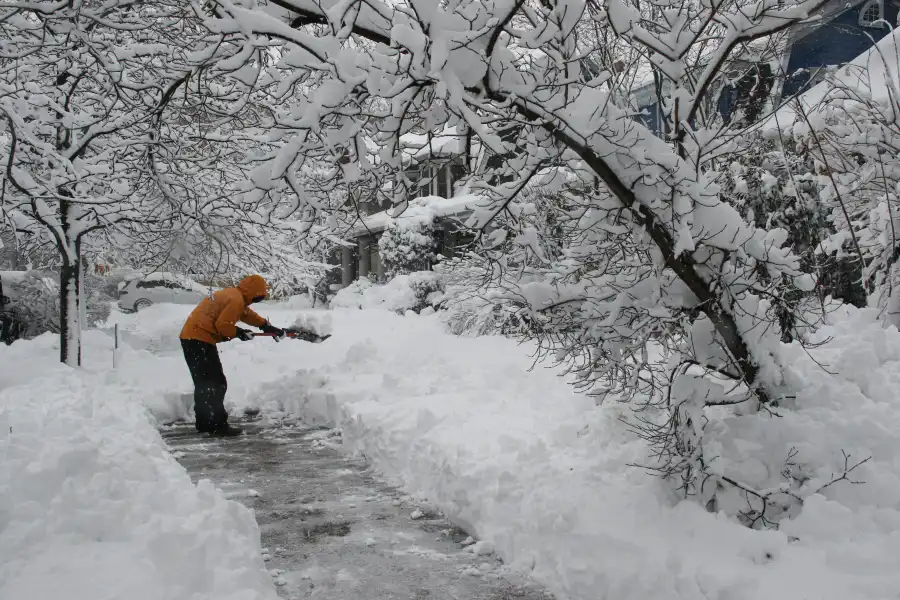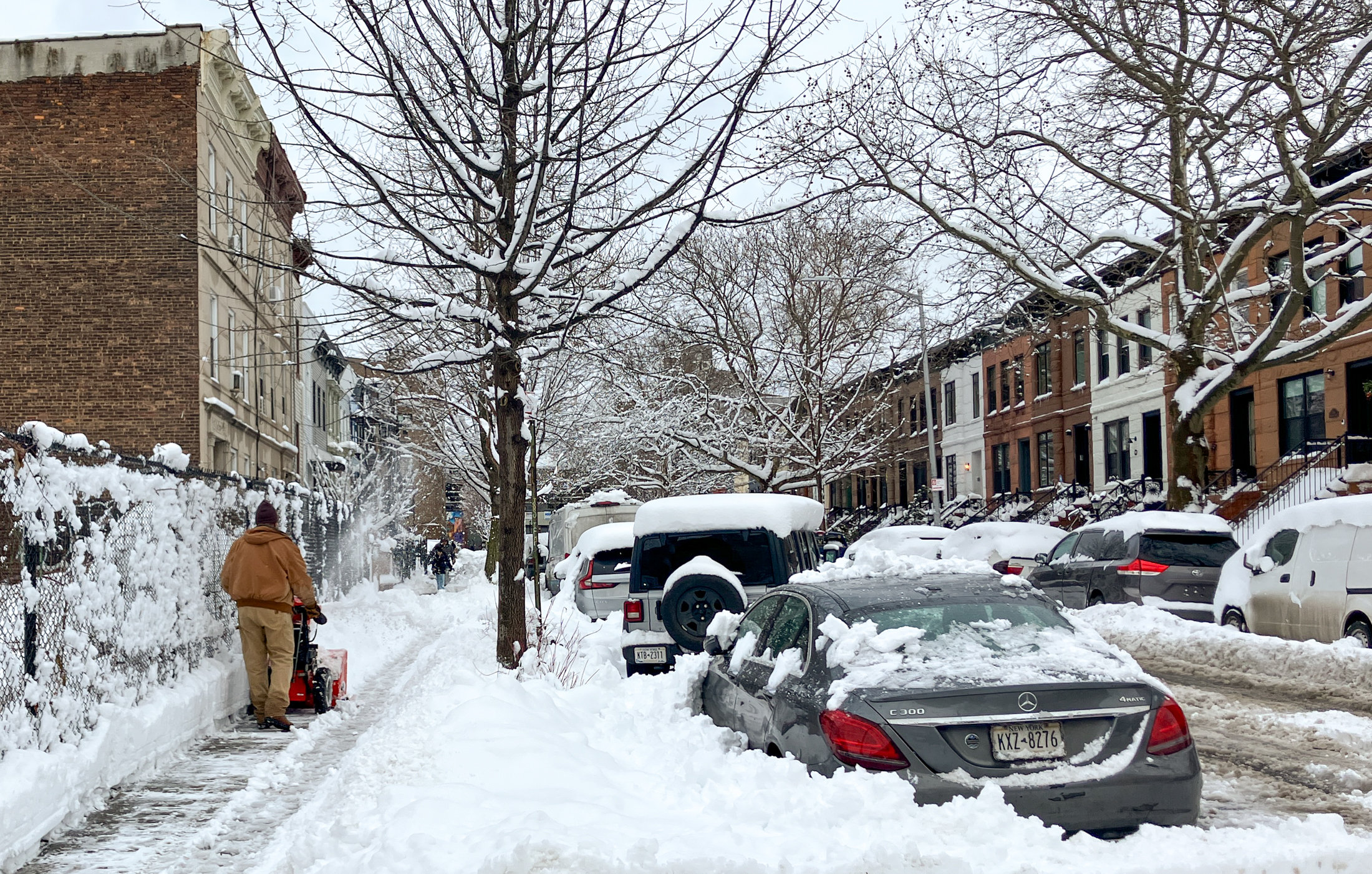John Catsimatidis: Tough Guy For Tough Times
John Catsimatidis: Self-made billionaire; owner of the Gristedes supermarket chain; developer of a planned, 660-unit project on Myrtle Avenue; potential mayoral candidate who says only he is tough enough to carry this city through the tough times ahead. In an interview with Brownstoner at his modest office in Hell’s Kitchen (not the trendy part), he…


John Catsimatidis: Self-made billionaire; owner of the Gristedes supermarket chain; developer of a planned, 660-unit project on Myrtle Avenue; potential mayoral candidate who says only he is tough enough to carry this city through the tough times ahead. In an interview with Brownstoner at his modest office in Hell’s Kitchen (not the trendy part), he describes a bleak future for Brooklyn and beyond. He’s not even positive the first phase of his Myrtle Avenue project is a “slam-dunk” because he hasn’t closed on the loan and “the banks are being a little more onerous than they used to be.” But Catsimatidis says the foundation was poured just in time for the 100 units to fall under the old 421-a rules that give him a tax breaks without providing any affordable units. Families United for Racial and Economic Equality (FUREE) just happens to be planning a protest outside his development site today, furious he reneged on his pledge to build 215 below-market apartments there. The group will also release a report on the displacement of residents and businesses as a result of the Downtown Brooklyn rezoning. Catsimatidis responds to our question about displacement: “There’s no displacement of residents that I know of. There’s no residential buildings that are really being torn down that I know of, and it’s just like I said, people have to stay where they are during a possible recession period.” We’ll find out in the coming months if he plans to officially throw his hat in the ring. Click through to read the interview, edited for length.
Brownstoner: You’ve eliminated the affordable housing component for your Myrtle Avenue project, which is [planned at] 660 units total. What do you think that means for other projects that would be seeking bonds?
It’s not true that we eliminated it forever. The first building we’re building, there’s not an affordable component. They didn’t have any municipal bonds to give us. For the affordable deal, they promised in the future that they think they’ll have some bonds available in 2009. So as we’re building, if we’re building, depending on the sanity of the real estate market in 2009, and if there are bonds available, and the bond market is open to buy these bonds, then we will consider building some affordable units in those buildings.
Looking forward today, the insanity going on in the mortgage market and what’s going on with Fannie Mae and Freddie Mac, they’re sold off 50 percent — I’m not terribly optimistic that the real estate market will come back next year. The building that we are building now, we wanted to continue to do something so it’s not just a vacant lot, and to provide essential services for the neighborhood like the Duane Reade that we’re contracted for. And the supermarket may be one of ours, it may not be one of ours. And one of the banks that were dealing with has agreed to provide a construction loan, which we haven’t closed on yet. But we did get the foundation in on time to meet the June 30 deadline for the 421-a tax abatement (under the old 421-a rules, developers could receive tax abatements without including affordable housing in their projects, unless they were building in certain Manhattan neighborhoods. As of June 30, the area where affordable housing is required has been greatly expanded, and includes Downtown Brooklyn).
Vince Tabone, Red Apple Group senior counsel: This project would not be viable but for the old 421-a. As it is, it’s only because of his economic wherewithal — he’s fronting the financing for the first phase while we’re negotiating with the bank so that we could have made that deadline.
You said you haven’t closed on the construction loan. Does that mean it’s not certain you’re going to move forward?
We’ve negotiated, and the banks are being a little more onerous than they used to be, but we feel it’s probably going to close. But it’s not a slam-dunk.
How much money in bond financing were you seeking per unit?
Lets call it 100 just to multiply it easily. 100 units, $25 million, it’s $250,000 per unit (total, or $1.25 million in bond financing per affordable unit that would have been created).
How do you think that the construction of all this new luxury or market-rate housing in Downtown Brooklyn impacts the lower- and middle-income residents?
First of all, market rate has a dual meaning. It is market rate as far as something you’re buying in Brooklyn. But it’s half price from Manhattan. So, I would almost consider it affordable- to middle-class housing at that market-rate. Even if we decided to sell them as condos, you’d be selling them at $600 [per square foot], $700 bucks maybe, versus Manhattan, which is anywhere from $1,200 to $1,500 a square foot. So, I would almost put it in the category of affordable, middle-class housing.
To people in Manhattan. But it’s not affordable to a lot of the people who are living in that neighborhood right now. Would you agree?
Then we might as well build nothing because we couldn’t build nothing. For whom do the bells toll? Think about it. I mean, should the taxpayers dish out money for affordable housing? Okay they’re willing to, but they ran out of the bonds.
So, you’re saying that without the subsidies housing can’t be built that is affordable to people living [in that neighborhood right now].
But then they’re already living there. If you want to bring in more people at those rates, then probably not. Where would you bring them in from, if they already have homes?
What about wages then? What could be done at the other end so more people could afford these houses?
Well, as of right now that’s not my department as far as wages … I worked at the Chamber of Commerce for 12 years at the West Side of Manhattan when the West Side of Manhattan was going through a revitalization. And the one thing I learned was, if business is doing well, people in the community are doing well. And if you want to kill businesses then people are not going to do well either, because there are not going to be the jobs.
Do you think prices are dropping because people have to put a higher percent down on their mortgage or because people are losing their jobs?
It’s a combination of both. I think a year ago, if we’re selling condominiums for $600,000, you go to the bank and borrow $550,000 and everybody would say, Okay, I’ll put $50,000 down on a down payment, my condo will be worth $800,000 a year from now,” and everybody has a good time. Now the banks are requiring the old-fashioned mortgages and not everybody has $120,000 to $140,000 for a down payment, so that’s one factor.
The other factor is, there’s a fear coming across Wall Street with the financial institutions, with the banks, Wachovia, all the investment bankers. There’s no deals being done. When there’s no deals being done, the next thing that happens after no deals is layoffs. That shoe has not dropped yet but the people working for these firms know that that shoe is about to drop because … that financial market is not going to turn around in 60 days.
So, is there a solution on the city level that can help ease us through this transition?
What’s going to happen is, people are going to [batten] down the hatches. And if you’re living in a rent-stabilized, rent-controlled apartment, you’re not necessarily going to decide to move to a larger apartment that might be market-rate right now.
For a while there was a lot of movement, and theoretically there will be more in the future. As the city continues to redevelop itself, do you think there’s something the city could be doing better to reduce the displacement of residents [and businesses] as it reshapes itself? Brooklyn in particular we’ll talk about.
There’s no displacement of residents that I know of [Downtown]. There’s no residential buildings that are really being torn down that I know of, and it’s just like I said, people have to stay where they are during a possible recession period
… When I grew up on 135th Street, my father was paying $48 a month rent. My father was a waiter and a bus boy. He wasn’t about to move into a $1,000 a month apartment just because he didn’t like living on 135th Street. I don’t know of any apartment buildings of great degree — maybe one, two, three, a small degree — that were torn down. And sometimes those people are paid large monies to displace themselves … But we’ve never torn down residential buildings.
… I went to Brooklyn Tech High School. I remember Dekalb Avenue, I remember Fort Greene Park was a combat zone. We never walked alone on those streets, we always had at least six guys with us. So, I remember those neighborhoods. I remember Myrtle Avenue when I first bought it 25 years ago.
Why did you buy it 25 years ago if it was a war zone?
It was a war zone. Because Long Island University was selling it. I looked at is as an opportunity to buy three city blocks for $400,000 or $500,000.
Now there’s a lot of new construction underway in Brooklyn, and of course across the city but again we’ll stick to Brooklyn. And the economy right now — the lending practices are tighter, the economy is beginning to sour. Do you think there are certain neighborhoods in danger of having a lot of uninhabited apartments, or half-built projects, or vacant lots where there was supposed to be something built, like in so many other cities across the country?
In Buffalo, I understand there’s 20,000 vacant homes.
Right. So, do you think that’s going to happen to places in Brooklyn?
Like I said, New York City is the greatest city in the world. And I think there’s a possibly of prices coming down to meet the needs of the people. And when the banks stop lending and I want to sell a house, there’s such a thing as seller financing. When the seller owns his house he can take a small down payment from the buyer and give him back a purchase-money mortgage (a loan provided by the seller as opposed to a bank, often given when the buyer is unqualified for a commercial mortgage).
And then in terms of jobs that would fill those buildings with people?
If you have less construction — and I think it was a terrible time for the city to have 421 go away — because if you have less construction, all those people who have been working construction jobs because the city’s been booming the last two, three years, you’re going to have a lot less work around.
Well, do you think that those construction workers are the people who are going to be filling these new apartments in Brooklyn?
Not necessarily.
When do you plan to formally announce you’re going to run for mayor, if you’re going to run for mayor?
We’re certainly looking at it very carefully and we’re thinking of forming an exploratory committee over the next month or two.
Did you change your party affiliation from Democrat to Republican already?
Yes.
And why did you do that?
Because I’m a moderate businessman. I believe business has to do well for people to do well. And a moderate businessman, the Democratic Party hasn’t nominated a moderate businessman in over 100 years … And I think when things are tough, you need somebody tough to manage the city.
What makes you tough?
40 years of surviving in business.





Polemicist, why do you have such a deep love for bashing FUREE? What have they done to you? Can’t help but think that you doth protest too much – that you’re so infuriated by FUREE’s message and work because they’re pointing out inequalities that benefit you, and somewhere deep down inside you know it’s true.
Anyhow, on the topic at hand – it’ll be a horrible day for NYC if Catsimatidis gets elected. How can someone who seriously hopes to put himself forth as a candidate for mayor so cavalierly dismiss a question about wages and helping people afford housing? “Well, as of right now that’s not my department as far as wages”? This guy wants to be mayor in 2009. Exactly when will all city residents’ financial well being (as opposed to rich developers’ well being) become his department? Oh, that’s right – probably never.
“Their demands fly in the face of any notion of liberty, property rights, or the equality of man under the law. In essence, their demands border on sedition and are at the very least morally repugnant. FUREE is a racist organization, and really has no place in any kind of legitimate discussion of public policy in New York City.”
So Furee’s policies give you the right to interject your racism and morally repugnant attitudes into a legitimate discussion of public policy? Your comments come right out of Mein Kampf, – people like you are the reason organizations like FUREE exist today. While you carry on about property rights and equality, it might serve you to remember it was white people with attitudes like yours that brought slaves to this country as property and denied them liberty and equality.
Obviously neither you nor “Joe” ever spent any time in that area. I did- there were plenty of residents. Just because you didn’t see something doesn’t mean it didn’t exist.
I love you, What. I fell of the chair laughing!
You’re right, 11217- I have visions of him with a map of Brooklyn, with the neighborhoods defined by little colored wood pieces that he shoves around with a fork (full of food)to create new neighborhoods. Polemicist would advise him so all the little black and brown pieces eventually wind up in the Atlantic. That’s their game plan.
SNL was right- there really are Landsharks.
Now we know the registered what is an impostor – s/he was never so easy to troll in the past!
Montrose,
I’m not the one who has started an organization that states there is 1) racial inequality and 2) that inequality is best served by taking money from other people.
Their demands fly in the face of any notion of liberty, property rights, or the equality of man under the law. In essence, their demands border on sedition and are at the very least morally repugnant. FUREE is a racist organization, and really has no place in any kind of legitimate discussion of public policy in New York City.
As for your comments regarding so-called displacement, a townhouse owner who sells his property is not displaced. He is like any other seller. As for the rest of your nonsense – Bridge Street? That has never been a residential area since the Dutch sailed into New York Harbor centuries ago. How on earth could anyone be displaced there? I believe you are suffering from a delusion common to many anti-development types – you incorrectly assume that new construction always involves displacement when the truth is that it rarely does as Joe makes clear.
Some people used to do things for the greater good without being compensated for it.
Those people are becoming more and more rare.
I’d hardly call him a real estate mogul – he’s not a Trump or a Rattner or a Gottlieb from the West Village. He bought a couple of blocks 20 years ago because he had the cash available. What were the rest of us doing 20 years ago? Have we brought ourselves up from nothing to be able to afford anything for 4 or 500K? I haven’t.
And, so what if he’s, well, “overweight”? So is Oprah and she’s got more money and power over the people than he does!
Gristede’s does suck. When I lived on the UES I would go there only to get the Mother Goose Liverwurst which no one else carried. Imagine my amazement when I saw it at the Super Foodtown on Fulton Street. There is a god. He looks like he should lay off the liverwurst.
“By what logic should this guy be forced to use his own money on his own property to build apartments for people who can’t afford them on their own?”
He is not forced to do anything. If he wants to build whatever he is allowed on his own as of right, he can do what he wants. If he wants to receive, or do something that requires, some kind of public concession — in the form of subsidies, tax breaks, variances etc. — to which he is not automatically entitled, by what logic should the government fail to obtain some kind of public benefit in exchange for its largesse? We can disagree as to whether affordable housing is a public benefit, but if you want something extra from the public fisc, you should be prepared to be expected to contribute something for the public good.